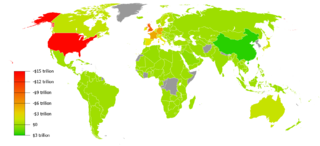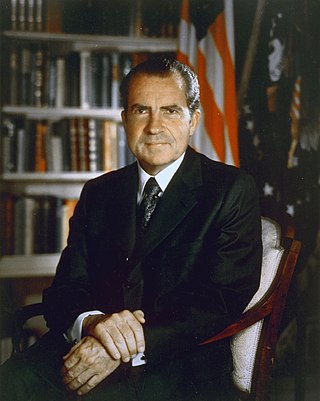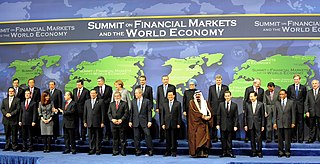Related Research Articles

The International Monetary Fund (IMF) is a major financial agency of the United Nations, and an international financial institution funded by 190 member countries, with headquarters in Washington, D.C. It is regarded as the global lender of last resort to national governments, and a leading supporter of exchange-rate stability. Its stated mission is "working to foster global monetary cooperation, secure financial stability, facilitate international trade, promote high employment and sustainable economic growth, and reduce poverty around the world." Established on December 27, 1945 at the Bretton Woods Conference, primarily according to the ideas of Harry Dexter White and John Maynard Keynes, it started with 29 member countries and the goal of reconstructing the international monetary system after World War II. It now plays a central role in the management of balance of payments difficulties and international financial crises. Through a quota system, countries contribute funds to a pool from which countries can borrow if they experience balance of payments problems. As of 2016, the fund had SDR 477 billion.

Carroll is a town in Coös County, New Hampshire, United States. The population was 820 at the 2020 census. The two largest villages are Twin Mountain and Bretton Woods. Carroll is an important access point for recreational areas in the White Mountains, including many 4,000-footers, the Zealand River area, the Presidential Range, and the Presidential Dry River Wilderness. The town is home to the Mount Washington Hotel at Bretton Woods and to the Highland Center at Crawford Notch, the Appalachian Mountain Club's four-season lodge.

The Bretton Woods Conference, formally known as the United Nations Monetary and Financial Conference, was the gathering of 730 delegates from all 44 allied nations at the Mount Washington Hotel, in Bretton Woods, New Hampshire, United States, to regulate the international monetary and financial order after the conclusion of World War II.
Bretton Woods can refer to:

In international economics, the balance of payments of a country is the difference between all money flowing into the country in a particular period of time and the outflow of money to the rest of the world. These financial transactions are made by individuals, firms and government bodies to compare receipts and payments arising out of trade of goods and services.

This is a list of international trade topics.

The Bretton Woods system of monetary management established the rules for commercial relations among the United States, Canada, Western European countries, and Australia among 44 other countries after the 1944 Bretton Woods Agreement. The Bretton Woods system was the first example of a fully negotiated monetary order intended to govern monetary relations among independent states. The Bretton Woods system required countries to guarantee convertibility of their currencies into U.S. dollars to within 1% of fixed parity rates, with the dollar convertible to gold bullion for foreign governments and central banks at US$35 per troy ounce of fine gold. It also envisioned greater cooperation among countries in order to prevent future competitive devaluations, and thus established the International Monetary Fund (IMF) to monitor exchange rates and lend reserve currencies to nations with balance of payments deficits.

Bretton Woods is an area within the town of Carroll, New Hampshire, United States, whose principal points of interest are three leisure and recreation facilities. Being virtually surrounded by the White Mountain National Forest, the vista from Bretton Woods toward Mount Washington and the Presidential Range includes no significant artificial structures other than the Mount Washington Cog Railway and the Mount Washington Hotel.

The Mount Washington Hotel is a hotel in Bretton Woods, New Hampshire, United States, near Mount Washington. It was designed by Charles Alling Gifford. In 1944, it hosted the Bretton Woods Conference, which established the International Monetary Fund and the World Bank.
International finance is the branch of financial economics broadly concerned with monetary and macroeconomic interrelations between two or more countries. International finance examines the dynamics of the global financial system, international monetary systems, balance of payments, exchange rates, foreign direct investment, and how these topics relate to international trade.
The International Trade Organization (ITO) was the proposed name for an international institution for the regulation of trade.

The Nixon shock was a series of economic measures undertaken by United States President Richard Nixon in 1971, in response to increasing inflation, the most significant of which were wage and price freezes, surcharges on imports, and the unilateral cancellation of the direct international convertibility of the United States dollar to gold.

Twin Mountain is an unincorporated community within the town of Carroll in the White Mountains of New Hampshire, United States. It is named for two prominent summits which rise to the south of the village, North Twin Mountain and South Twin Mountain.
Raymond Frech Mikesell was an economics professor at the University of Oregon and was believed to be the last surviving economist from the Bretton Woods conference.

The 2008 G20 Washington Summit on Financial Markets and the World Economy took place on November 14–15, 2008, in Washington, D.C., United States. It achieved general agreement amongst the G20 on how to cooperate in key areas so as to strengthen economic growth, deal with the 2008 financial crisis, and lay the foundation for reform to avoid similar crises in the future. The Summit resulted from an initiative by the French and European Union President, Nicolas Sarkozy, Australian Prime Minister Kevin Rudd, and the British Prime Minister, Gordon Brown. In connection with the G7 finance ministers on October 11, 2008, United States President George W. Bush stated that the next meeting of the G20 would be important in finding solutions to the economic crisis. Since many economists and politicians called for a new Bretton Woods system to overhaul the world's financial structure, the meeting has sometimes been described by the media as Bretton Woods II.
The Volvo International, also known as the Pilot Pen International, was a professional tennis tournament founded in 1972 as the Bretton Woods WCT it was played on clay courts to 1984 and on outdoor hard courts from 1985 to 1998. It was first held at the Mount Washington Resort in Bretton Woods, New Hampshire in the United States in 1973 after Rod Laver had run a successful summer camp there. The International was originally part of the Grand Prix tennis circuit until the formation of the ATP Tour in 1990, when it became part of the Championship Series until its dissolution.
An international monetary system is a set of internationally agreed rules, conventions and supporting institutions that facilitate international trade, cross border investment and generally the reallocation of capital between states that have different currencies. It should provide means of payment acceptable to buyers and sellers of different nationalities, including deferred payment. To operate successfully, it needs to inspire confidence, to provide sufficient liquidity for fluctuating levels of trade, and to provide means by which global imbalances can be corrected. The system can grow organically as the collective result of numerous individual agreements between international economic factors spread over several decades. Alternatively, it can arise from a single architectural vision, as happened at Bretton Woods in 1944.
The London Gold Pool was the pooling of gold reserves by a group of eight central banks in the United States and seven European countries that agreed on 1 November 1961 to cooperate in maintaining the Bretton Woods System of fixed-rate convertible currencies and defending a gold price of US$35 per troy ounce by interventions in the London gold market.
The Bretton Woods Committee is an American organization created in 1983 as a result of the agreement between U.S. Secretary of the Treasury, Henry Fowler, and U.S. Deputy Secretary of the Treasury, Charls Walker – at the time a Democrat and a Republican, respectively. The agreement they arrived upon was that world leaders should express to the public the significance of international finance institutions (IFIs), like the Bretton Woods Institutions, and how important it was for their prominence in the world to be maintained. After the 1944 Bretton Woods Conference, the International Monetary Fund and World Bank were established; they are now often referred to as "Bretton Woods Institutions".
John S. Koudounis is an American business executive who currently serves as president and chief executive officer for Calamos Investments. Previously he was the president and chief executive officer for Mizuho Securities USA Inc., a subsidiary of Japanese banking holding company Mizuho Financial Group He is a regular commentator for television and financial news programs including Fox Business, CNBC, CNN, Bloomberg, and others. At 44 years of age, Koudounis was the youngest CEO of any Wall Street firm when he was appointed in 2010.
References
- ↑ "15 Most Important facts about IMF". Jagranjosh.com. 15 May 2018. Retrieved 12 October 2023.